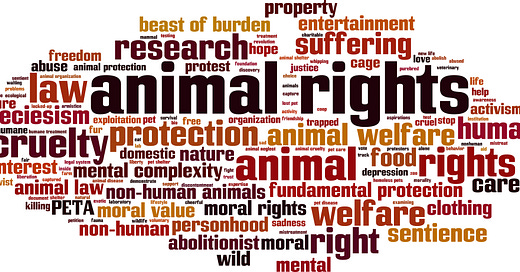Recent scientific breakthroughs have shattered long-held beliefs about the inner lives of animals. From bees engaging in playful chases to octopuses demonstrating complex problem-solving and pain avoidance, a growing body of evidence suggests that animals possess consciousness and experience emotions.
‘‘Recent discoveries in animal cognition reveal that many species, including insects and octopuses, are sentient, prompting urgent calls for ethical treatment and a shift towards a compassionate vegan lifestyle.’’
This paradigm shift has prompted leading scientists to issue "The New York Declaration on Animal Consciousness," urging a reevaluation of how we treat animals. In light of these discoveries, it's imperative to recognize the ethical implications and consider embracing a vegan lifestyle.
Expanding Understanding of Animal Consciousness
Traditionally, the concept of consciousness was reserved for humans, overlooking the cognitive abilities of other species. However, scientific advancements have revealed a remarkable diversity of consciousness across the animal kingdom. Creatures once seen as mere automatons, like insects, fish, and crustaceans, are now recognized as sentient beings capable of feeling joy, pain, and a range of emotions.
Research by leading scientists demonstrates that bees exhibit playful behavior, while studies on octopuses highlight their capacity to feel pain and solve complex problems. These are just a few examples of the growing body of evidence challenging the anthropocentric view of consciousness.
Ethical Imperative of Veganism
"The New York Declaration on Animal Consciousness" underscores the urgent need for a shift towards more compassionate and ethical treatment of animals. One of the most profound ways individuals can honor this declaration is by adopting a vegan lifestyle. By abstaining from animal products, we refuse to contribute to the exploitation and suffering of sentient beings in industries like factory farming, fishing, and animal experimentation.
The Cruelty of Animal Agriculture
The link between animal consciousness and the ethics of animal agriculture is undeniable. The industrialized food system subjects billions of animals to unimaginable suffering and exploitation every year. Confined in cramped cages, chickens live in constant stress, while cattle endure brutal slaughterhouse practices. These realities, documented by investigative journalists and animal rights organizations, stand in stark contrast to our evolving understanding of animal sentience.
A Choice for Compassion and Beyond
Choosing veganism is not just about dietary restrictions; it's a moral imperative that aligns with the principles of compassion, empathy, and justice. By rejecting the consumption of animal products, individuals not only alleviate the suffering of sentient beings but also contribute to environmental sustainability. Animal agriculture is a major contributor to greenhouse gas emissions, deforestation, and water pollution. Veganism offers a powerful tool to combat these environmental challenges.
Moreover, a plant-based diet can offer a multitude of health benefits. Studies have linked veganism to a lower risk of heart disease, type 2 diabetes, and certain cancers.
Conclusion
As society grapples with the implications of animal consciousness, we are faced with a fundamental choice: to perpetuate a system of exploitation and suffering or to embrace compassion and empathy. "The New York Declaration on Animal Consciousness" serves as a clarion call for change, challenging us to reassess our relationship with animals and the natural world. By embracing veganism, we affirm our commitment to a future where all beings are treated with dignity and respect. Let us seize this pivotal moment to cultivate a more compassionate and ethical world for animals and humans alike.
Sources:
The New York Declaration on Animal Consciousness: https://sites.google.com/nyu.edu/nydeclaration/declaration
Videos:
General Resources
Books:
Dominion: The Power of Animals in Nature and in Our Imagination by Matthew Scully
Animal Liberation by Peter Singer
Eating Animals by Jonathan Safran Foer
A Billion Hungry Mouths: Feeding the World Without Consuming the Planet by Colin Tudge
Websites and organizations:
Documentaries:
Articles:
"The Case for Animal Rights" by Tom Regan
‘‘Why We Love Dogs, Eat Pigs, and Wear Cows: An Introduction to Carnism’’ by Melanie Joy
‘‘Animal Rights: The Abolitionist Approach’’ by Gary L. Francione
‘‘Fellow Creatures: Our Obligations to the Other Animals’’ by Christine Korsgaard
Seeds of Compassion: Finding Jesus Christ in a Vegan World by Michael Corthell
Receive a single informative article daily at 12:01 AM by email. Explore my homepage with exciting vegan and plant-based news content and delightful and delicious recipes for additional updates. Stay connected to the vegan world and all it has to offer.
Visit The Vegan Project Global our Facebook page for more vegan outreach and education.
Also, visit our new YouTube channel
The information on this vegan/plant-based blog is for general informational purposes only. It is not intended as legal, medical, or professional advice. Readers should consult with appropriate professionals for specific advice tailored to their situation. The blog owner is not responsible for any reliance on the information herein.




